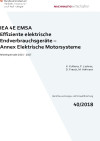Suchergebnisse
IEA PVPS Task 1 Trends 2018: Trends in Photovoltaic applications - Survey Report of Selected IEA Countries between 1992 and 2017

Der IEA PVPS Trends Report gibt einen globalen Überblick über Photovoltaik-Technologieentwicklungen, den globalen Markt sowie die politischen Rahmenbedingungen weltweit. Ebenso wird die wachsende Rolle bzw. die Wettbewerbsfähigkeit der Photovoltaik in der Energiewirtschaft beschrieben.
Mehrsprachig
Downloads zur Publikation
IEA 4E Annex: Elektrische Motorsysteme. Arbeitsperiode 2014 - 2017

Im Rahmen des Annex Electric Motor Systems soll Bewusstseinsbildung über das große Energieeinsparpotenzial von Motorsystemen und das Aufzeigen von Wegen zur Realisierung dieser Potenziale erfolgen. Aktuell umfasste die Österreichische Beteiligung insbesondere die Task Leitung Energy Audits for Motor Systems zur Erarbeitung von Empfehlungen zur Durchführung von normkonformen Energieaudits in Motorsystemen.
Schriftenreihe
40/2018
K. Kulterer, P. Lackner, D. Presch, M. Hofmann
Herausgeber: BMVIT
Deutsch, 50 Seiten
Downloads zur Publikation
Science Brunch "Urbane Wärmewende"
11. März 2019, 09:30 - 14:30 Uhr
The Stage in der Donau-City-Straße 1, 1220 Wien
Insgesamt sechs Spannende und zukunftsweisende Forschungsprojekte aus den Programmen des Klima- und Energiefonds und dem BMVIT zeigen auf, wie die urbane Wärmewende gelingen kann. Damit leisten der Klima- und Energiefonds und das BMVIT einen wichtigen Beitrag zur Erreichung der internationalen Klimaziele mit Innovationen aus Österreich.
IEA HPT Annex 42: Final Report

Der Endbericht des IEA HPT Annex 42 gibt einen Überblick über die Einbindung von intelligenten Wärmepumpen in Smart Grids.
Herausgeber: BHD, IEA HPT Annex 42
Englisch, 239 Seiten
Downloads zur Publikation
Produktion der Zukunft – 32. Ausschreibung
Im Rahmen der FTI-Initiative "Produktion der Zukunft" werden 2019 rund 20 Millionen Euro für themenspezifische Fördermaßnahmen im Programm bereitgestellt. Ausschreibungsschwerpunkte: Industrie 4.0, Additive Fertigung, Werkstoffe, Robotik und Künstliche Intelligenz in einer vernetzten Produktion und Biobasierte Industrie.
Workshop: Waste gasification
26. - 27. November 2019
Aston University, Birmingham, GB
Joint workshop IEA Bioenergy Task 33 and Supergen Bioenergy Hub
ECBCS Newsletter vom Juni 2010
Der aktuelle ECBCS Newsletter wirft einen Blick auf die "Low-Carbon" Gebäude-Entwicklung in Großbritannien.
Informations- und Beratungstage
EinreicherInnen erhalten im Rahmen von Sprechtagen in Graz, Linz, Wien und Innsbruck Unterstützung bei der Vorbereitung von Projektvorschlägen.
IEA-SHC Task 47 Positionspaper
Das Position Paper zu IEA Solar Heating and Cooling-Task 47 "Nachhaltige Sanierung von Dienstleistungsgebäuden" ist veröffentlicht und steht zum Download zur Verfügung.
27. ÖGUT-Umweltpreis 2012 vergeben
Am 5. Dezember wurde im Rahmen des ÖGUT-Jahresempfangs im feierlichen Rahmen vor 300 geladenen Gästen der ÖGUT Umweltpreis 2012 vergeben.
Newsletter SUSPRISE joint call
Die Ergebnisse des SUSPRISE Joint Calls und eine Kurzbeschreibung der geförderten Projekte wurden vom ERA-Net SUSPRISE in einem Newsletter veröffentlicht.
Neue Veranstaltungen im Herbst
Einreichleitfaden aktualisiert
Der Einreicherleitfaden zur ersten Ausschreibung ENERGIE DER ZUKUNFT (July 2007, Version 2.0) steht absofort im Bereich "Ausschreibung" zum Download bereit.
Infoveranstaltung Wien (21.5.03)
In Informationsveranstaltungen werden Schwerpunkte und Ausschreibungsinhalte und Einreichmodalitäten vorgestellt. Für potenzielle EinreicherInnen besteht die Möglichkeit zu einem Beratungsgespräche.
Projektpräsentation: IMMO-RATE
Der Leitfaden für das Immobilienrating nachhaltiger Wohnbauten wird am 22. Juni in Wien und am 13. Juli in Bregenz vorgestellt. Der Termin am 29. Juni ist abgesagt.
Symposium: SESEC VI SYMPOSIUM
30. Oct 2007 - 1. Nov 2007
Olympic MuseumLausanne, CH
International Networking for Promoting Sustainable Development at the Local Level
Workshop: Advanced Fuel Cells
1. September 2010
University of Technology
Graz, AT
The main goals of the workshop are the presentation of the research´s main areas of the Implementing Agreement and the discussion about the current development status of fuel cell systems.
Konferenz: ökosan´15
17. - 19. Juni 2015
Messecongress GrazGraz, AT
6. internationale Konferenz für hochwertige energetische Sanierung und Nachverdichtung mit Holzbausystemen.
EASEY Online Ratingvorbereitung - Transfer
Aufbereitung und Übermittlung von theoretisch konzeptionellem Wissen über die Bewertung von nachhaltiger Entwicklung von KMU an drei finanzwirtschaftliche BeraterInnengruppen. Nachhaltiges Wirtschaften, so die These, trägt langfristig nachweisbar zur Verbesserung der Kreditrückzahlungsfähigkeit von KMU bei.
Neue Standards für alte Häuser - konkret
Zielgruppernorientierte, vernetzte Verbreitung des Sanierungsleitfadens "Neue Standards für alte Häuser" im Bau-und Baunebengewerbe sowie bei Bauherrn bzw. -frauen
